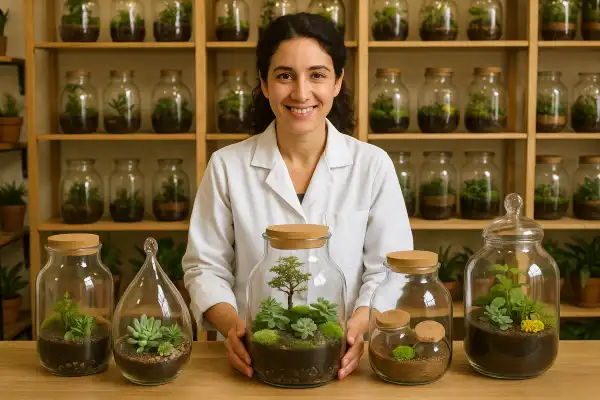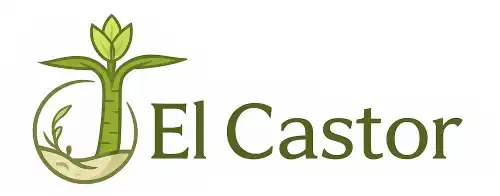Starting your terrarium journey raises an essential question: where to buy a terrarium kit that meets your needs? Many aspiring terrarium builders feel overwhelmed by the prospect of sourcing individual materials—glass containers, drainage stones, activated charcoal, specialized soil mixes, and suitable plants. The appeal of an all-in-one kit becomes clear when you realize how much time and effort it saves.
Building enclosed ecosystems has captivated gardeners for generations, dating back to Victorian Wardian cases that protected exotic plants during long sea voyages. Today’s terrarium kits make this fascinating hobby accessible to everyone, regardless of experience level.
Our question of June is: Is labradorite safe to use in damp terrariums?
Where to buy a terrarium kit?
You can purchase terrarium kits from various retailers across the United States, including online marketplaces like Amazon and Walmart, specialty plant retailers, craft stores such as Michaels and Hobby Lobby, and local garden centers. The key is matching the right source to your specific needs and experience level.

Online retailers and marketplaces
Amazon and Walmart offer extensive selections of terrarium kits, ranging from simple beginner sets to comprehensive packages with live plants. Walmart carries kits like the Better Homes & Gardens Plant Terrarium Kit for under $10, and more comprehensive options like the DUSPRO Recycle Terrarium Starter Kit for around $25. These major retailers provide convenient shipping options and customer reviews to help guide your purchase decision.
Specialty online retailers like Eastern Leaf focus exclusively on terrarium supplies, offering curated selections of both succulent and air plant kits. Companies like OME Design specialize in tropical terrarium ecosystems with complete DIY kits that include detailed instructions. These specialty retailers often provide higher-quality components and more unique plant selections than general marketplaces.
Craft stores and hobby retailers
Michaels carries multiple terrarium kit options, including hanging terrarium kits for $42 and smaller DIY succulent kits available through their MakerPlace platform. Their kits often include decorative elements like miniature dinosaurs and natural hair brushes for terrarium maintenance. Hobby Lobby stocks terrarium kits such as the Grow-N-Glow Terrarium Kit, which includes glowing elements for a unique twist on traditional terrariums.
Craft stores excel at providing kits designed for specific projects or themes. They frequently run promotions and offer coupons, making them budget-friendly options for beginners or those wanting to try terrarium building without significant investment.
Home improvement and garden centers
Home Depot carries terrarium kits like the Creations by Nathalie DIY Terrarium Kit, which includes live succulents, glass containers, and all necessary materials. Both Home Depot and Lowe’s provide terrarium supplies and guidance for DIY projects, though their kit selections may be more limited than specialized retailers.
These stores offer the advantage of seeing products in person before purchasing. Their garden center staff can often provide local plant recommendations and troubleshooting advice for your specific growing conditions.
Local nurseries and garden centers
Local garden centers and nurseries provide personalized service and plants specifically adapted to your regional climate. Many nurseries offer terrarium workshops where you can learn proper techniques while assembling your kit. Local nurseries often carry unique and hard-to-find plant varieties that big-box stores don’t stock.
The expertise available at local nurseries proves invaluable for beginners. Staff members can recommend plants that thrive in your specific indoor conditions and provide ongoing support as your terrarium ecosystem develops.
Specialty plant retailers and subscription services
Specialized nurseries like TN Nursery offer curated terrarium plant packages with wild-collected specimens selected by horticultural experts. Companies like Flower & Twig Nursery provide comprehensive DIY kits with flat-rate shipping, making specialty plants accessible nationwide.
These retailers focus on plant quality and often include detailed care instructions specific to the species they provide. Many offer guarantees on plant health and provide customer support throughout the growing process.
What to look for in a quality terrarium kit
Essential components include proper drainage materials like gravel or pebbles, activated charcoal for filtration, appropriate potting soil, and plants suited for terrarium environments. Quality kits provide clear instructions and include basic tools like tweezers or brushes for maintenance.
Examine the glass container quality—it should be thick enough to withstand handling and have an opening large enough for easy planting and maintenance. Look for kits that include activated charcoal, which eliminates toxins and provides fresh air circulation in closed terrariums.
Plant selection matters significantly. Avoid kits with fast-growing plants like common philodendrons or spider plants, which quickly outgrow terrarium spaces. Instead, seek kits featuring slow-growing species with interesting textures and forms that thrive in high-humidity environments.
Budget considerations and value comparison
Terrarium kits range from $8 for basic starter sets to over $40 for comprehensive packages with live plants and premium containers. Mid-range kits around $25-30 typically offer the best value, including quality soil amendments, preserved moss, and basic tools.
Consider the total cost of sourcing materials individually versus purchasing a complete kit. While building from scratch allows customization, kits often provide better value for beginners and include components that might be difficult to source separately, such as activated charcoal or specialized soil blends.
Factor in shipping costs for online purchases, especially for kits containing live plants, which may require expedited shipping. Local purchases eliminate shipping concerns but may limit your selection options.
Conclusion
The terrarium kit market offers something for every skill level and budget, from simple craft store options to premium specialty collections. Success depends on matching your source to your specific needs—whether that’s convenience, plant quality, local support, or unique design elements.
Last month, I purchased a comprehensive kit from a local nursery for a workshop I was conducting. Watching participants’ excitement as they assembled their miniature ecosystems reminded me why I fell in love with terrarium building six years ago. The nurseryman had selected plants perfectly suited to our regional humidity levels, and every participant’s terrarium thrived. That personal touch and local expertise made all the difference—exactly what I hope you’ll find when you choose your perfect terrarium kit source.
El Castor is your exclusive terrarium guide.
